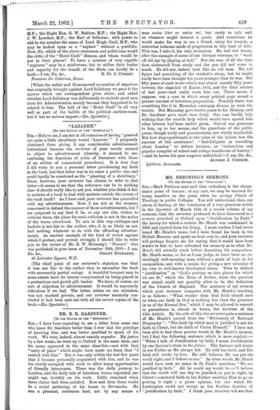DR. S. R. GARDINER.
[To THE EDITOR OF THE " SPECTATOR"]
have been expecting to see a letter from some one who knew Dr. Gardiner better than I ever had the privilege of knowing him, and was better qualified to speak of his work We were, indeed, almost exactly aequales. My junior by a few weeks, he went up to Oxford in the same term, and his name appeared in the same class-list,—not with that "unity of place " which might have made me deem that " I ranked with him." But it was only within the last few years that I became personally acquainted with him, and he was too closely occupied with work to allow many opportunities of friendly intercourse. There was the daily journey to London, and the daily tale of laborious hours, expended, one might say, lavishly on his work. Little remained when these claims had been satisfied. Now and then there would be a social gathering at his house in Sevenoaks. He was a pleasant, courteous host, not by any means a man unius /awl or unius rei, but ready to talk well on whatever might interest a guest. And sometimes he would make his way to see a friend, using his tricycle, a somewhat toilsome mode of progression in this land of hills. This was, I take it, his only recreation. He had not learnt, after the example of some of our literary veterans, to " ward off old age by playing at ball." But the sum of all the time thus abstracted from study and the pen did not come to much. He did not, indeed, look like an old man. His tall figure had something of the student's stoop, but he might easily have been thought ten years younger than he was. But fifty years of such work—there was almost exactly fifty years between the class-list of Easter, 1851, and the fatal seizure of last year—had really worn him out. There never, I suppose, was a case in which every printed page meant a greater amount of laborious preparation. Possibly there was something like it in Macaulay, curiously diverse as were the results. But Macaulay gave twelve years to his History, and Dr. Gardiner gave more than forty. One can hardly help wishing that the outside help which would have spared him other labours had been earlier given. Oxford was generous to him, up to her means, and the guardians of the public purse, though tardy and parsimonious, not wholly neglectful. But how disproportionate to the value of the labour was the amount of this assistance ! " Indefatigable in travelling about London" to deliver lectures, an "industrious and popular compiler of school and college handbooks of history," —and he leaves his opus magnum unfinished !—I am, Sir, &o., Ightham, Sevenoaks. ALFRED J. Cannon.










































 Previous page
Previous page